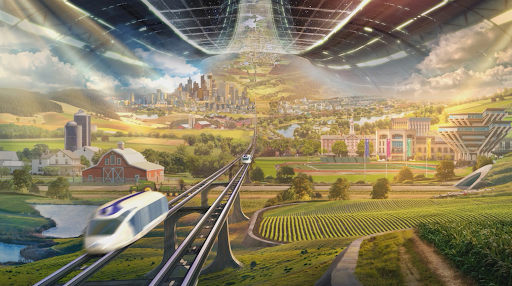
How To Avoid Space Colony Revolts With Just Two Key Ingredients.
Share
This weeks fan question is a very intriguing one where science fiction has dipped its toe in many a film and book.
But without further ado, let's dive in deep and: Ask ARSE.
"Hey ARSE, big fan and follower.
I watch a fair few movies and notice that most outer space societies and colonies are pretty much a utopia, even between different alien species.
I was wondering, how does that happen and is it realistic?
Cheers,
Trevor"
Thanks for the question Trent and a god one at that.
The most immediate one that comes to mind is the Star Trek model, where all alien life is treated equally for the most part and are given equal opportunity and standing.
But is this achievable?
While we can't push into the alien side of things (we aren't sure where they are!) we can take a look at what has provided a good platform for colonies and societies in an isolated setting in the past.

1. The Constitution
People need a mixture of freedom and a set of rules that everyone respects and abides by.
"What is good for me and is good for us at the same time."
Firm but fair rules create a society where people can engage with one another in a system that favours safety by expectation.
An example would be that you do not expect to be charged 5x the going rate for a newspaper as much as the vendor would not expect you to rob them for the same newspaper.
A system of expected fairness and safety that creates an environment far from the days of us having to endure severe environmental factors on the way to hunt wild mammoths.
A constitution is a set of expectations for both the citizens and the governing body that should have fairness and safety at the forefront.

Fairness independent of race, gender, societal or economic status as well as safety of the physical kind and safety in one's future.
Living day-to-day is something mostly eradicated by first-world societies as lower-income populations are prone to despair meaning higher substance abuse and resorting to crime.
Fairness, prosperity and a sense of freedom are paramount in creating a government and/or society where all followers are content.
This includes purpose such as work as well as a feeling of optimism about the future.
Where this goes wrong is where strong power inequalities are made and the stronger party dictates the lives and future of the individual or even the entire population.
Authoritarian dictatorships are definitely a no.
This is how revolts happen, ask Marie Antoinette.
A revolt in space or a colony that is keeping people safe from the hostile environment like Mars is a potential disaster waiting to happen.
Should extremists or dissatisfied colony dwellers attack structures or gain control of vital life-support services like air and water, it can be devastating to the fragile societal structure of the colony.
If they so choose they can also use these to harm or kill everyone within the colony or craft.
So, try and keep them happy.

2. Free Press and Representation.
A population without a voice kills their spirit.
Not to get all Orwellian, but a society in which people are not spoken for or heard kills the very heart of those people.
Where societies fall short is when a free independent press is compromised or void altogether.
Freedom of the press is important because it is a means of keeping citizens aware of the comings and goings of the government which works for the population.
A free press is a basic human right that has come under fire recently with the furore over "fake news" and outlets aligning themselves politically.
Even so, the population has the right to be heard through the press or at the very least by political representation.

Depending on the size of the population, government or political representatives might not be necessary and groups similar to our worker's unions could suffice.
The alignment of unions and free press could keep the colony or spacecraft authoritative body accountable.
Where this can be a problem is when private companies are involved and hold no responsibility for the lives of its employees in the void of space.
There is almost nothing stopping a private corporation from simply allowing their workforce to die in the vacuum of space other than the cost to replace them.
The balance between slavery and happy working conditions on Earth has evolved over our short tenure on this planet, but this is not extended into space.
Before people look at joining any future colonisations outside of our world special considerations must be made in regards to their personal and populace rights.
There must be a balance between civil liberties and the need for high output of work in the vacuum of space, as a solely libertarian workforce might not get as much done as needed.

Governing bodies must be kept in check with a far and just constitution while the colony populace has an equally weighted voice that is fuelled by a free and objective press.
What happens without it?
Take a look at most countries that house civil conflicts, or countries that have been this way and have degraded their citizens representation and rights to a free press.
(We're looking at you America...)
What is your idea of the perfect outer space society?
Let us know in comments as we thrust into the deep unknown...
#Space_Aus




